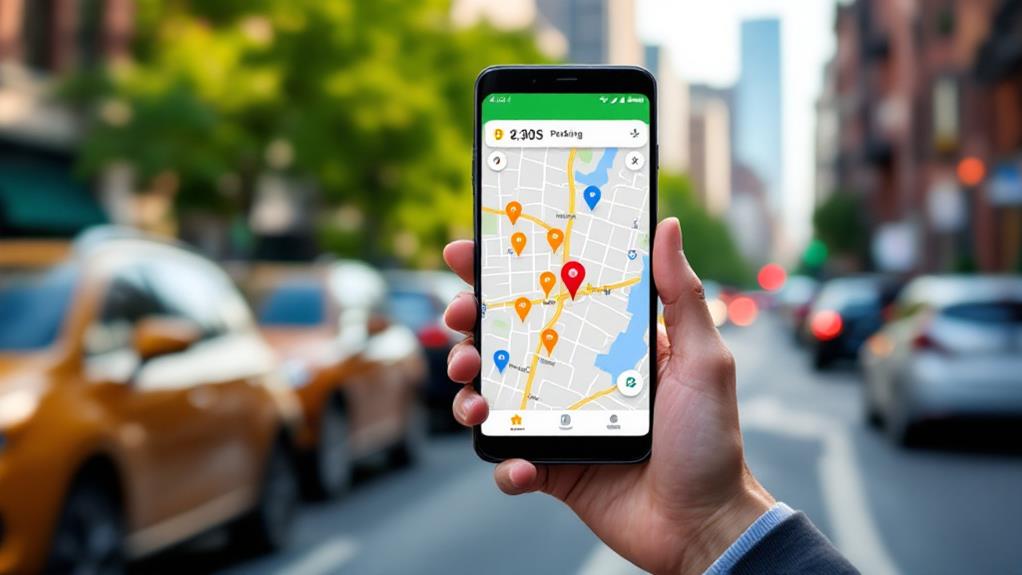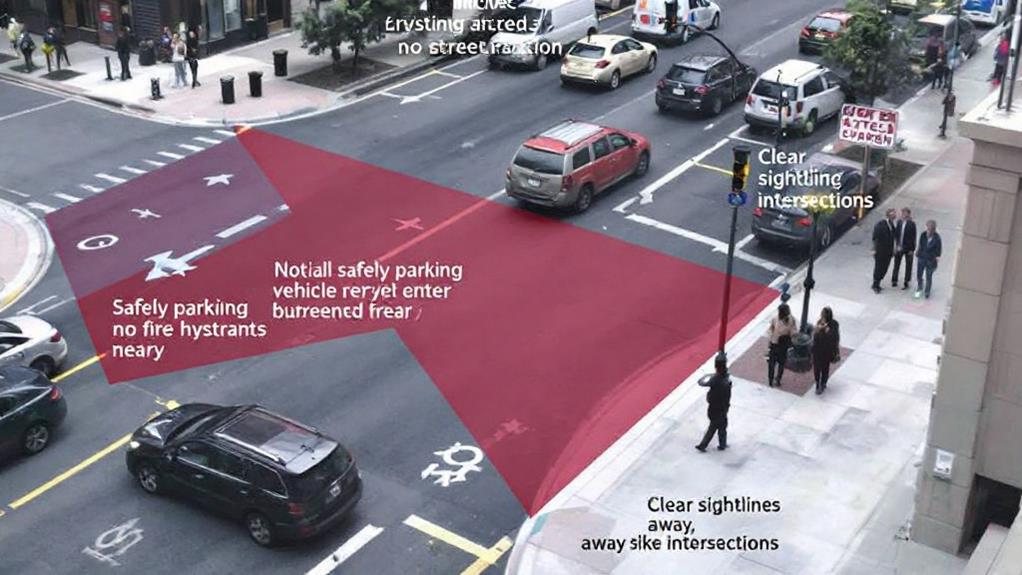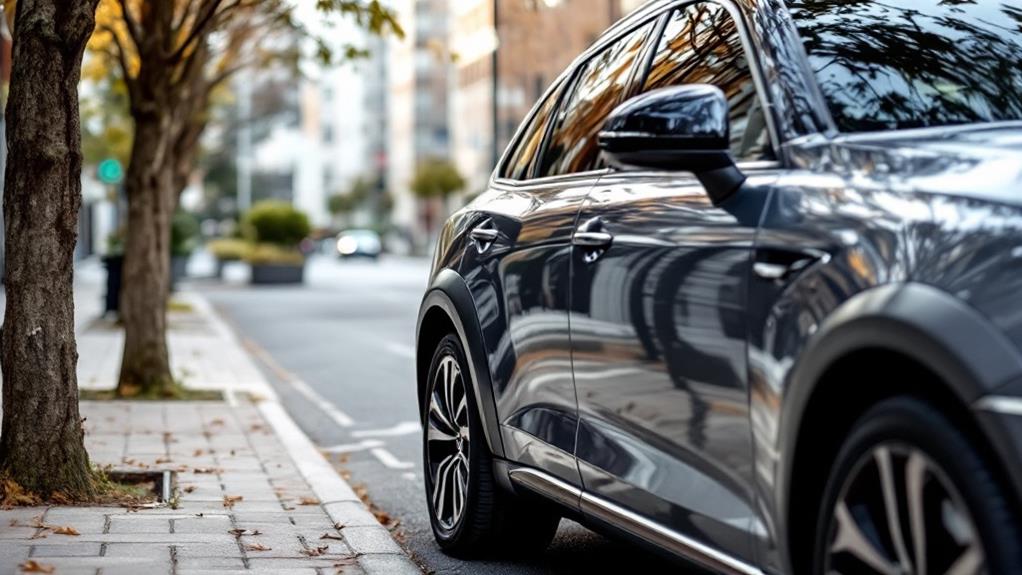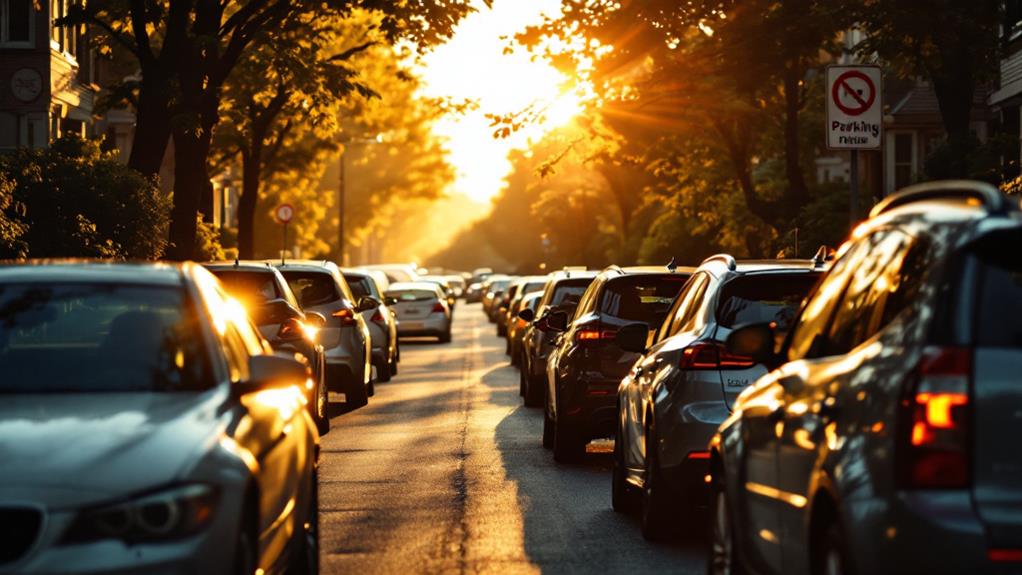Street Parking Near Events: What to Know and Expect

When attending events, you'll face unique street parking challenges. Expect specific regulations, including time restrictions, metered zones, and no-parking areas. Local authorities often increase enforcement during events, so be prepared for potential fines or towing. Research local rules and pay attention to signs to avoid issues. For events with multiple entry times, parking needs may vary throughout the day. Venue size and event format also impact parking requirements. Remember, one space per 2-4 guests is a general rule of thumb. Understanding these factors will help you traverse event parking more effectively and guarantee a smoother experience overall.
Event Format Impacts Parking Needs
Many event organizers overlook the significant impact that event format has on parking needs. When planning an event, it's essential to consider how the structure of your gathering affects the number of parking spaces required.
Events with a single start and end time, like sports games, concerts, or theater performances, demand parking for all attendees simultaneously. In these cases, you'll need to make sure there are enough parking spaces to accommodate the entire crowd at once. On the other hand, events with multiple entry times, such as festivals or tours, only require parking for the number of attendees present at any given moment.
Keep in mind that the total number of tickets sold doesn't always reflect the actual number of guests on-site at a specific time. Crowds often arrive in waves, creating busy periods that require more parking. To precisely calculate your parking needs for events with multiple entries, determine your hourly capacity by taking into account the number of attendees allowed in at once and the interval between entries. This approach helps you avoid overestimating or underestimating your parking requirements, ensuring a smoother experience for your guests and the surrounding community.
Estimating Guest Numbers
While understanding event formats is key, accurately estimating guest numbers is the cornerstone of effective parking management. When planning for event parking, you'll need to ponder more than just the total number of tickets sold. Remember that crowds often arrive in waves, so you'll need to account for peak times when calculating parking needs.
For events with a single start time, you'll need enough parking spaces for the entire crowd. However, if your event has multiple entry times, you can focus on accommodating the maximum number of guests present at any given moment. To estimate this, calculate your event's hourly capacity based on group size and entry intervals.
Don't forget to factor in the duration of guests' stay, including time spent at concessions or gift shops. This will help you determine how long each parking space will be occupied. As a general rule, aim for one parking space per 2-4 guests. By carefully estimating guest numbers and mulling over these factors, you'll be better equipped to manage event parking efficiently and avoid overcrowding or underutilization of available spaces.
Venue Size and Parking Requirements
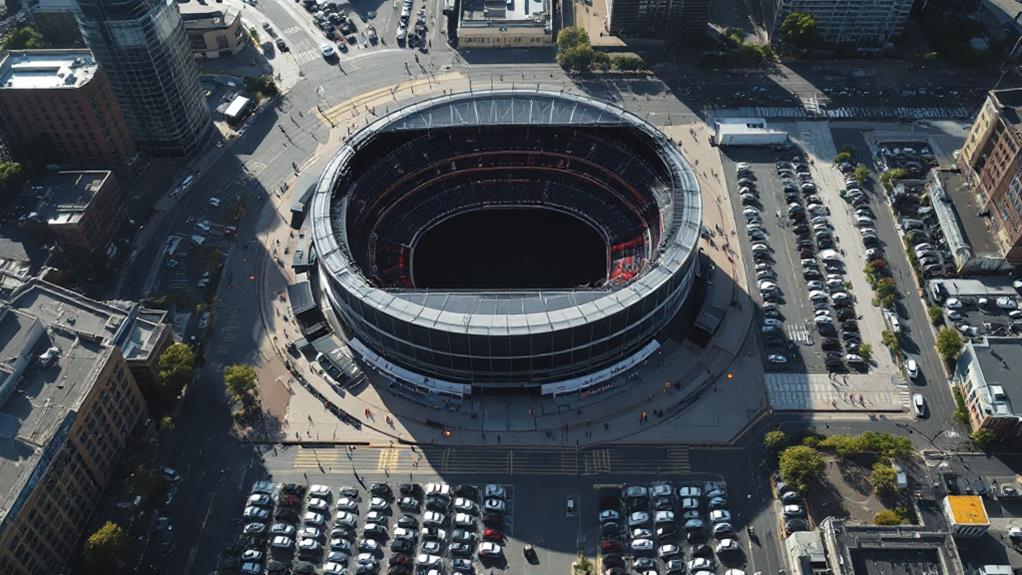
Venue dimensions play an essential role in determining parking requirements for events. As you plan your event, you'll need to evaluate how the venue size affects parking availability. Generally, retail spaces recommend one parking spot per 200 square feet of gross floor area. However, event venues often have different needs.
For example, a 5,000-square-foot venue might require around 50 parking spots, while a 50,000-square-foot space could need about 250 spots. Keep in mind that these numbers can vary based on local government regulations and the specific needs of your event venue.
When estimating parking requirements, examine the number of guests allowed in at a time and the event duration. Shorter events may need fewer parking spots as spaces are vacated more quickly, while longer events must account for extended guest stays. To calculate your venue's hourly capacity, factor in the interval time between guest arrivals and departures.
Remember that parking requirements aren't one-size-fits-all. You'll need to assess your venue's unique characteristics and consult local regulations to determine the appropriate number of parking spots for your event.
Calculating Hourly Capacity
To accurately plan for parking needs, you'll need to calculate your event venue's hourly capacity. This pivotal step helps determine the number of guests arriving within a specific timeframe, allowing you to assess parking options and manage logistics effectively.
To calculate hourly capacity, consider two key factors: the number of guests allowed in each group and the interval time between groups. Smaller groups with shorter intervals typically result in higher hourly capacities. For example, a venue accommodating 120 guests every 300 seconds can handle 600 people per hour. In contrast, a venue allowing 800 guests every 480 seconds can accommodate 960 people hourly.
Understanding your venue's hourly capacity is essential for events with multiple entry times. It helps you anticipate peak arrival periods and plan accordingly. With this information, you can better coordinate with local authorities to manage street parking and investigate alternative parking options if needed. Remember, proper capacity calculation guarantees smoother event operations and helps prevent parking-related issues that could negatively impact your guests' experience. By taking the time to accurately determine your venue's hourly capacity, you'll be better prepared to handle parking demands and other logistical challenges.
Guest Duration Considerations
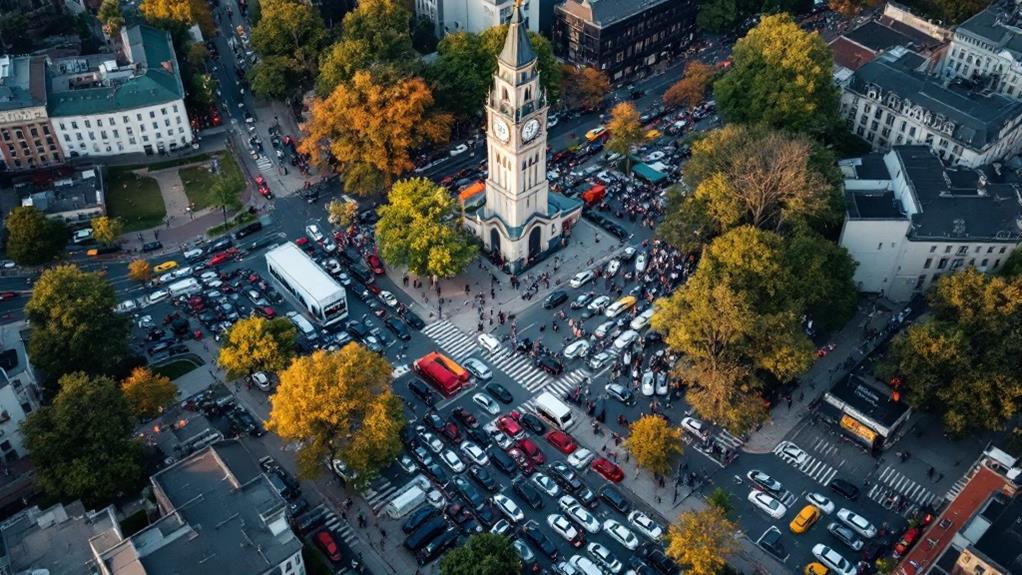
Having calculated your venue's hourly capacity, you'll now need to factor in how long guests typically stay at your event. Guest duration is a pivotal element in determining your parking requirements. The longer visitors remain on-site, the more parking spaces you'll need to accommodate everyone.
Consider the nature of your event when estimating guest duration. A quick, hour-long escape room experience will have a faster turnover than an all-day festival with multiple activities. If you're offering additional attractions like concessions, bars, or gift shops, expect guests to linger longer, increasing your parking needs.
For example, if your event averages 2.5 hours per guest and 40 people arrive each hour, you might only need 40 parking spots. However, if guests stay longer, you'll require more spaces to handle the overlap. When planning for escape rooms, factor in time for check-in, the game itself, and any post-game activities.
Local Regulations for Street Parking
Event organizers must traverse a maze of local regulations when it comes to street parking. Cities often implement specific rules for parking near event venues, including time restrictions, metered zones, and no-parking areas. It's essential to check signs and local ordinances to avoid penalties.
When parking near events, you'll likely encounter increased enforcement. Officials may issue tickets for overstaying time limits or parking in restricted areas. Some streets offer free parking, while others require payment through mobile apps or meters. Be prepared for either scenario.
Residential areas close to venues may have permit-only parking or temporary event-related restrictions. These measures aim to protect local residents from event-related congestion. As an attendee, you must be aware of these regulations to avoid fines or towing.
To guarantee a hassle-free experience, always check signs and research local parking rules before attending an event. Pay attention to time limits, payment requirements, and any special restrictions. By understanding and following local regulations, you can avoid costly mistakes and focus on enjoying the event without worrying about parking-related issues.
Timed Ticketing and Parking Management
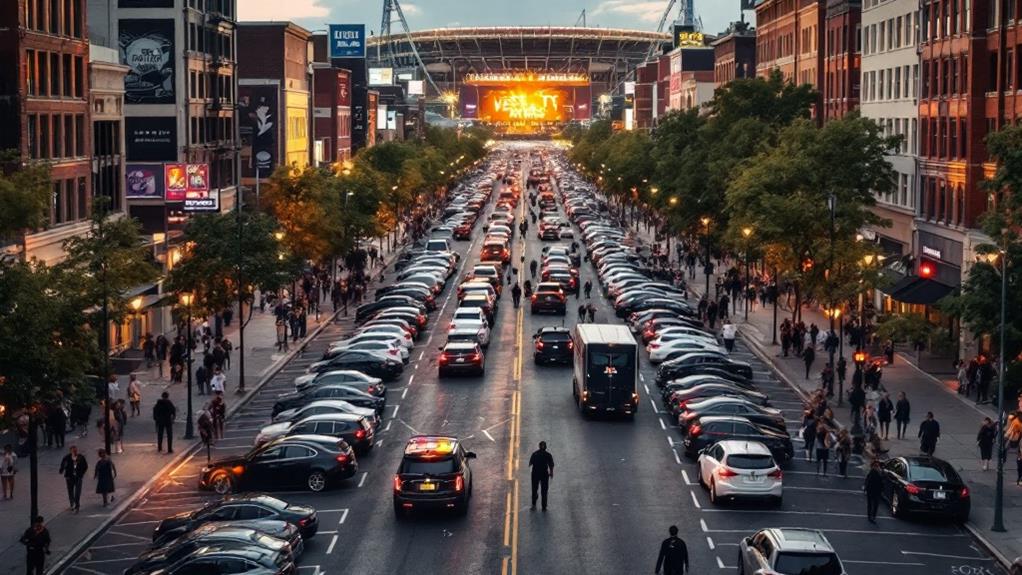
As parking regulations become more complex, event organizers are turning to innovative solutions like timed ticketing systems. These systems help manage parking demand and capacity by controlling the number of guests arriving at specific times. When you're attending an event, you might encounter this type of parking management strategy.
Timed ticketing works by coordinating your entry time with parking availability. This secures a smooth traffic flow and prevents overcrowding. You'll likely have the option to pre-book your parking spot through real-time monitoring and reservation systems. When you arrive at your designated time, you'll find your spot waiting for you.
This approach offers several benefits. You'll experience less congestion during peak arrival and departure periods, as entry times are staggered to distribute the parking load. This efficient parking management enhances your overall experience by minimizing delays and frustration.
When attending events with timed ticketing and parking management, be sure to follow your assigned arrival time. This helps maintain the system's effectiveness and guarantees a smoother experience for everyone. By embracing these modern parking solutions, you'll spend less time searching for a spot and more time enjoying the event.
Accessibility and Handicapped Parking
In accordance with federal and local regulations, event venues provide designated handicapped parking spaces to guarantee accessibility for all attendees. You'll find these spaces closest to venue entrances, marked with the international symbol of accessibility. To park in these spots, you must display a valid state-issued disabled placard or license plate on your vehicle.
The number of handicapped parking spaces varies based on the venue's total parking capacity and local regulations. If you're attending an event, be aware that these spaces are strictly enforced. Parking without proper credentials may result in ticketing or towing of your vehicle.
When planning your visit, remember that handicapped parking spaces are limited. Arrive early to secure a spot if you need one. Some venues offer additional assistance, such as golf cart shuttles, to help you access the event if you have mobility challenges.
If you don't qualify for handicapped parking, respect these spaces and leave them available for those who need them. By following the rules and being considerate, you'll contribute to a more accessible and enjoyable event experience for everyone.
Alternative Transportation Options
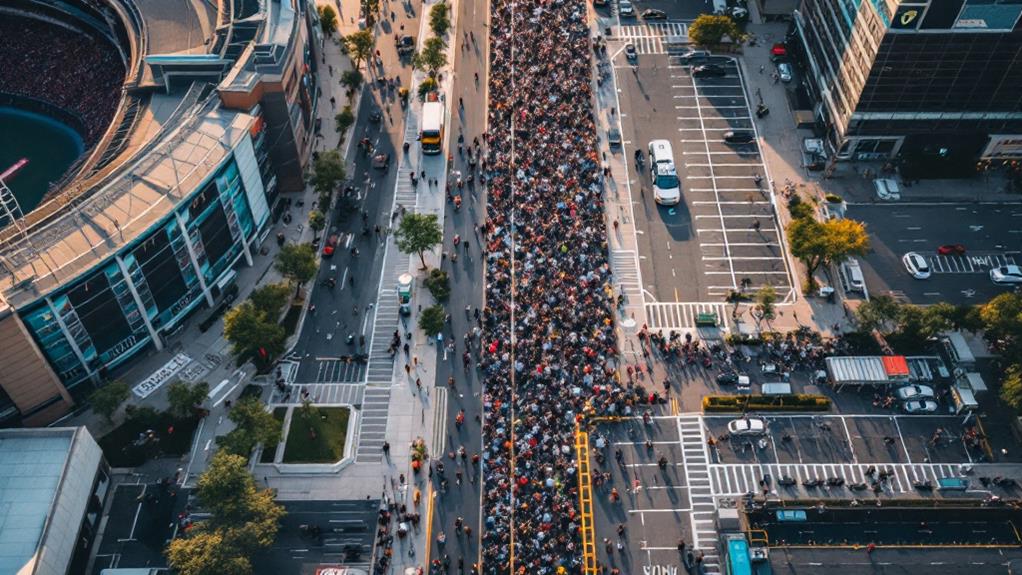
Exploring alternative transportation options can markedly reduce parking stress and enhance your event experience. Houston's METRORail system offers a convenient and efficient way to reach many event venues without the hassle of driving and parking. You'll find that public transportation not only saves you time but also money on parking fees.
Ridesharing services like Uber and Lyft provide another accessible option. They'll drop you off close to the venue, eliminating the need to search for parking spots. For those living nearby, consider walking or biking to the event. It's a sustainable choice that promotes health and saves you from parking woes.
Some venues and parking lots offer shuttle services, transporting you from remote parking areas to the event entrance. This can be a great compromise if you prefer driving part of the way.
Here are four key benefits of using alternative transportation:
- Reduced stress from parking searches
- Cost savings on parking fees
- Environmentally friendly options
- Opportunity to avoid traffic congestion
